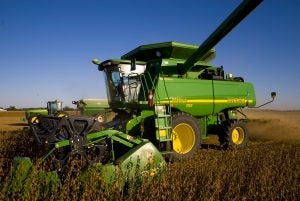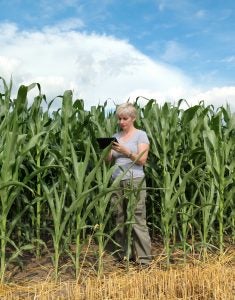How John Deere and Cornell can ensure big data benefits farmers and the environment

Modern farm equipment comes more outfitted than a fully loaded car. These precision farming machines are furnished with multiple sensors that collect data during planting, nutrient application and harvest. A typical farmer now has 5 gigabytes of data, five seasons’ worth, in storage.
This trove of data promises to revolutionize farming, giving farmers unparalleled insights for business and stewardship decisions. Unfortunately, the data collected tends to stay on equipment hard drives, greatly reducing its usefulness to farmers.
A new partnership between John Deere and Cornell University promises to change that. Ag-Analytics, a Cornell data platform, syncs with John Deere’s Operation Center and makes it easier than ever for farmers to access and analyze farm data. Cornell is the first university to integrate with John Deere, and the analytical tools now available to farmers include a crop insurance estimator and yield and risk management forecasts.
[Tweet “How John Deere and Cornell can ensure big data benefits farmers and the environment, via @rtparkhurst.https://edf.org/Xoz”]
Ensuring data provides value to farmers
Two key barriers stand in the way of farmers fully harnessing the value of data analytics: the burden of being asked to report the same information in multiple surveys and the lack of tangible operational benefits from data collection. The collaboration between Cornell and John Deere is a big stride toward removing these barriers.
Ag-Analytics serves as a single platform for housing multiple analytics tools. It integrates a large number of public data sources, including soil type and weather. When combined with detailed agricultural data from John Deere farm equipment, farmers can get estimates on USDA Risk Management Agency insurance, satellite vegetation imagery and real-time feeds on field conditions.
Using data analytics to scale sustainability

Environmental Defense Fund is working with Cornell’s Atkinson Center for a Sustainable Future to investigate the potential to develop an agricultural sustainability data hub, which would aggregate data, analyze it and provide guidance to farmers about conservation practices they can implement in their operations. Integrating with John Deere’s Operation Center is an important first step in this process.
Longer term, anonymized and aggregated data could be used to show larger, regional improvements on factors such as nitrate runoff or nitrous oxide emissions. It would be an important way of boosting supply chain transparency between major food companies who need to quantify progress toward supply chain goals, and the actual practices farmers are implementing on the ground.
Big data holds huge promise for agriculture and the environment. By ensuring that the process of data collection, availability and analysis is streamlined and secure, public-private partnerships between companies, universities and nonprofits are paving the way for that promise to be realized.
Related:
Why privacy is an essential piece of agriculture’s big-data revolution >>
Why collaboration between ag equipment and tech companies is a good thing for the environment >>
A farmer’s perspective: 4 reasons why collecting data is important >>












